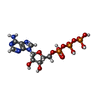[English] 日本語
 Yorodumi
Yorodumi- PDB-6pzi: Cryo-EM structure of the pancreatic beta-cell SUR1 bound to ATP only -
+ Open data
Open data
- Basic information
Basic information
| Entry | Database: PDB / ID: 6pzi | ||||||
|---|---|---|---|---|---|---|---|
| Title | Cryo-EM structure of the pancreatic beta-cell SUR1 bound to ATP only | ||||||
 Components Components | ATP-binding cassette sub-family C member 8 | ||||||
 Keywords Keywords | MEMBRANE PROTEIN / KATP / SUR1 / ATP | ||||||
| Function / homology |  Function and homology information Function and homology informationsulfonylurea receptor activity / potassium channel activity / ABC-type transporter activity / ATP hydrolysis activity / protein-containing complex / ATP binding / metal ion binding / plasma membrane Similarity search - Function | ||||||
| Biological species |  Cricetus cricetus (black-bellied hamster) Cricetus cricetus (black-bellied hamster) | ||||||
| Method | ELECTRON MICROSCOPY / single particle reconstruction / cryo EM / Resolution: 4.5 Å | ||||||
 Authors Authors | Shyng, S.L. / Yoshioka, C. / Martin, G.M. / Sung, M.W. | ||||||
| Funding support |  United States, 1items United States, 1items
| ||||||
 Citation Citation |  Journal: Elife / Year: 2019 Journal: Elife / Year: 2019Title: Mechanism of pharmacochaperoning in a mammalian K channel revealed by cryo-EM. Authors: Gregory M Martin / Min Woo Sung / Zhongying Yang / Laura M Innes / Balamurugan Kandasamy / Larry L David / Craig Yoshioka / Show-Ling Shyng /  Abstract: ATP-sensitive potassium (K) channels composed of a pore-forming Kir6.2 potassium channel and a regulatory ABC transporter sulfonylurea receptor 1 (SUR1) regulate insulin secretion in pancreatic β- ...ATP-sensitive potassium (K) channels composed of a pore-forming Kir6.2 potassium channel and a regulatory ABC transporter sulfonylurea receptor 1 (SUR1) regulate insulin secretion in pancreatic β-cells to maintain glucose homeostasis. Mutations that impair channel folding or assembly prevent cell surface expression and cause congenital hyperinsulinism. Structurally diverse K inhibitors are known to act as pharmacochaperones to correct mutant channel expression, but the mechanism is unknown. Here, we compare cryoEM structures of a mammalian K channel bound to pharmacochaperones glibenclamide, repaglinide, and carbamazepine. We found all three drugs bind within a common pocket in SUR1. Further, we found the N-terminus of Kir6.2 inserted within the central cavity of the SUR1 ABC core, adjacent the drug binding pocket. The findings reveal a common mechanism by which diverse compounds stabilize the Kir6.2 N-terminus within SUR1's ABC core, allowing it to act as a firm 'handle' for the assembly of metastable mutant SUR1-Kir6.2 complexes. | ||||||
| History |
|
- Structure visualization
Structure visualization
| Movie |
 Movie viewer Movie viewer |
|---|---|
| Structure viewer | Molecule:  Molmil Molmil Jmol/JSmol Jmol/JSmol |
- Downloads & links
Downloads & links
- Download
Download
| PDBx/mmCIF format |  6pzi.cif.gz 6pzi.cif.gz | 224.5 KB | Display |  PDBx/mmCIF format PDBx/mmCIF format |
|---|---|---|---|---|
| PDB format |  pdb6pzi.ent.gz pdb6pzi.ent.gz | 158 KB | Display |  PDB format PDB format |
| PDBx/mmJSON format |  6pzi.json.gz 6pzi.json.gz | Tree view |  PDBx/mmJSON format PDBx/mmJSON format | |
| Others |  Other downloads Other downloads |
-Validation report
| Summary document |  6pzi_validation.pdf.gz 6pzi_validation.pdf.gz | 794.4 KB | Display |  wwPDB validaton report wwPDB validaton report |
|---|---|---|---|---|
| Full document |  6pzi_full_validation.pdf.gz 6pzi_full_validation.pdf.gz | 797.9 KB | Display | |
| Data in XML |  6pzi_validation.xml.gz 6pzi_validation.xml.gz | 34.9 KB | Display | |
| Data in CIF |  6pzi_validation.cif.gz 6pzi_validation.cif.gz | 57.6 KB | Display | |
| Arichive directory |  https://data.pdbj.org/pub/pdb/validation_reports/pz/6pzi https://data.pdbj.org/pub/pdb/validation_reports/pz/6pzi ftp://data.pdbj.org/pub/pdb/validation_reports/pz/6pzi ftp://data.pdbj.org/pub/pdb/validation_reports/pz/6pzi | HTTPS FTP |
-Related structure data
| Related structure data |  20535MC  6pz9C  6pzaC  6pzbC  6pzcC M: map data used to model this data C: citing same article ( |
|---|---|
| Similar structure data |
- Links
Links
- Assembly
Assembly
| Deposited unit | 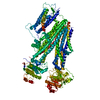
|
|---|---|
| 1 |
|
- Components
Components
| #1: Protein | Mass: 177333.578 Da / Num. of mol.: 1 Source method: isolated from a genetically manipulated source Source: (gene. exp.)  Cricetus cricetus (black-bellied hamster) Cricetus cricetus (black-bellied hamster)Gene: ABCC8, SUR / Production host:  |
|---|---|
| #2: Chemical | ChemComp-ATP / |
| Has ligand of interest | Y |
| Has protein modification | Y |
-Experimental details
-Experiment
| Experiment | Method: ELECTRON MICROSCOPY |
|---|---|
| EM experiment | Aggregation state: PARTICLE / 3D reconstruction method: single particle reconstruction |
- Sample preparation
Sample preparation
| Component | Name: SUR1 / Type: COMPLEX / Entity ID: #1 / Source: RECOMBINANT |
|---|---|
| Source (natural) | Organism:  Cricetus cricetus (black-bellied hamster) Cricetus cricetus (black-bellied hamster) |
| Source (recombinant) | Organism:  |
| Buffer solution | pH: 7.5 |
| Specimen | Embedding applied: NO / Shadowing applied: NO / Staining applied: NO / Vitrification applied: YES |
| Specimen support | Details: unspecified |
| Vitrification | Cryogen name: ETHANE |
- Electron microscopy imaging
Electron microscopy imaging
| Experimental equipment |  Model: Titan Krios / Image courtesy: FEI Company |
|---|---|
| Microscopy | Model: FEI TITAN KRIOS |
| Electron gun | Electron source:  FIELD EMISSION GUN / Accelerating voltage: 300 kV / Illumination mode: FLOOD BEAM FIELD EMISSION GUN / Accelerating voltage: 300 kV / Illumination mode: FLOOD BEAM |
| Electron lens | Mode: BRIGHT FIELD |
| Image recording | Electron dose: 40 e/Å2 / Film or detector model: GATAN K2 SUMMIT (4k x 4k) |
- Processing
Processing
| EM software |
| |||||||||
|---|---|---|---|---|---|---|---|---|---|---|
| CTF correction | Type: NONE | |||||||||
| Symmetry | Point symmetry: C1 (asymmetric) | |||||||||
| 3D reconstruction | Resolution: 4.5 Å / Resolution method: FSC 0.143 CUT-OFF / Num. of particles: 123757 / Symmetry type: POINT |
 Movie
Movie Controller
Controller






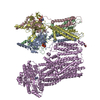
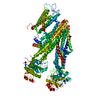
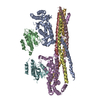
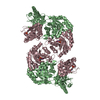
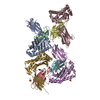
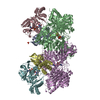
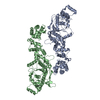

 PDBj
PDBj

